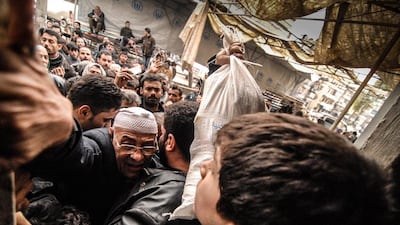For the six million Syrian refugees who rely on the World Food Programme (WFP), an already desperate situation may be about to get worse. As The National reported yesterday, the WFP has enough money for just about another month. Unless it raises funds quickly and effectively once again, just like it did recently – when it managed to appeal to the world's charitable instincts for one of the biggest aid operations in its history – food aid to Syrians will stop.
That will mean that a dispossessed, displaced and desperately harried people will struggle to keep body and soul together in the depths of winter. Their plight has all the hallmarks of a massive humanitarian crisis with tragic consequences for a people who have endured years of conflict, which has killed more than 200,000 and forced millions to seek uncertain refuge within Syria and abroad. This is an appalling state of affairs but the uncertainty makes it a great deal worse.
The month began with the WFP sending a text message to the refugees warning that food aid would be suspended because it had nearly run out of money. Somewhat despairingly, it launched a crowdfunding campaign with a hip hashtag #ADollarALifeline and an easy listening soundtrack I Need A Dollar. Money poured in, from the Americans, the Canadians and the Syrians, in that order.
That was, obviously, a finite amount and the WFP may soon be texting the poor refugees the same dismal news all over again next month. It’s not right and it’s not fair. There is a particular rhythm, logic and process of fund-raising for the United Nations’ many agencies, but surely food aid – the very staff of life – must not be at risk. As the refugee crisis deepens, it would be unfair to rely, as usual, on the Arabian Gulf and the US. Instead, the world must reach into its collective pockets and find what it takes to keep every refugee fed. Nothing less will do.

